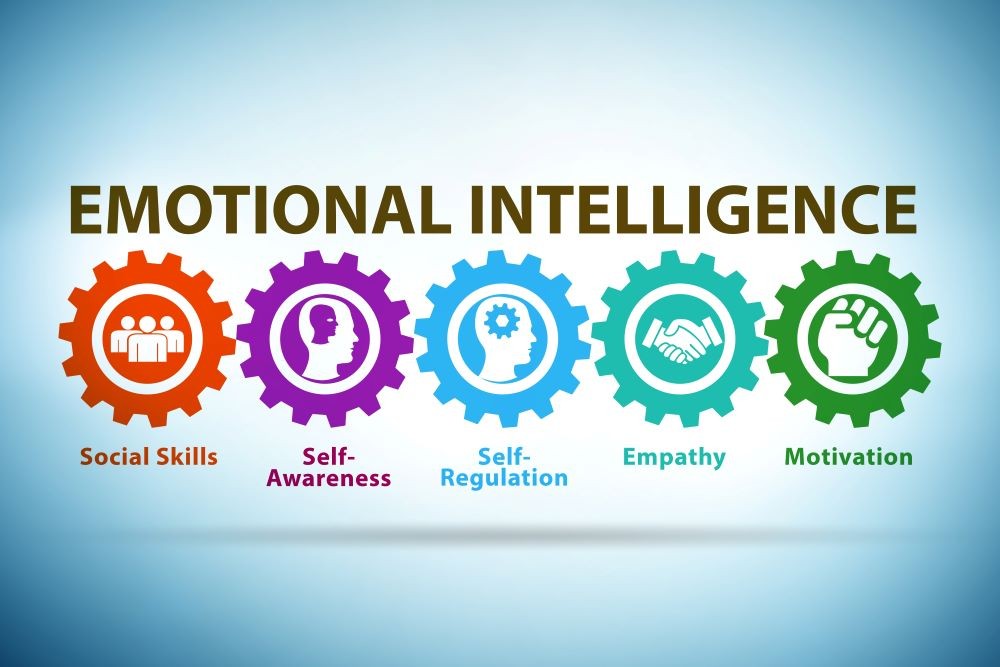
As a modern leader faced with plenty of other concerns competing for your time and attention, why should you care about building your emotional intelligence—the ability to identify and manage your own emotions as well as to be able to empathize with and manage others’ emotions to boot?
In a business climate where most organizations—including meetings and events companies—are having difficulty with hiring and retention, bringing on or keeping an employee with a high EQ can be especially valuable when the overall number of staff may be suffering.
For starters, The World Economic Forum states that more than 90% of top performers boast higher emotional intelligence (EQ) than peers, while just one in five low-performing individuals can claim to boast high EQ. Likewise, as pioneering researcher Daniel Goleman explains, studies show that while possessing excellent training, a sharp mind and great ideas can help when it comes to succeeding in life and business, without EQ, many people won’t ever become great leaders.
[New Scott Steinberg Book: New Book Provides Keys to Hiring and Retaining Talent]
Emotional intelligence isn’t just a vital trait to possess, either. It’s also a fairly complex one to come by, breaking down into four broad categories: Self-awareness and self-management; personal competence; social awareness; and relationship management. All are vastly different disciplines those seeking to gain EQ must master.
For those looking to gain a deeper understanding of EQ and increase their personal talents, it may help to note that there are several major trends that are crucial to get your head around when it comes to mastering emotional intelligence.
Firstly, to succeed in life and business, it’s important to bring together a collective group of individuals with high EQ and set them toward accomplishing a shared task—not simply to set a goal and rely on a single superstar to help you achieve it.
[Related: How to Improve Employee Recruitment and Retention]
Group EQ for the Win
Colleen Stanley, president of SalesLeadership, maintains that EQ-strong sales groups boast a significantly higher overall batting average than even the most aggressive individual salespeople. She credits this success on these groups’ shared focus on results and outcomes, because they are more likely to take responsibility for their actions and because they are humble enough to drop dead-end business prospects.
This skill is important, Stanley points out, because it requires enough self-awareness to actually listen to a potential customer’s needs and know when those needs cannot be fulfilled so that you can apply time and resources toward more productive pursuits.
Secondly, for those hoping to apply EQ to positive effect in the workplace, it’s also important to hire candidates for their potential, not their proficiency. To determine who’s a prospective high-performer, How to Be Happy at Work author Annie McKee recommends leaning hard on references before determining who you hire, and while interviewing, responding with strong follow-up questions to vague answers.

13 Attributes to Consider
Emotional intelligence expert Justin Bariso further says that there are 13 attributes to consider when determining which prospective hires boast the highest EQ, and when weighing their abilities as well:
- Thinking about feelings
- Pausing before reacting
- Controlling one’s thoughts
- Improving from criticism
- Being authentic
- Demonstrating empathy
- Praising others
- Giving feedback
- Offering apologies
- Forgiving and forgetting
- Keeping commitments
- Helping others
- Avoiding emotional sabotage
[Related: How You Must Adapt to the Post-Pandemic Future of Work]
These are the elements to watch for in potential hires. It is also important, experts say, to keep a watchful eye out for candidates whose presentations may be over-rehearsed. According to Microsoft’s head of global talent acquisition, individuals who have stock answers for everything may not be as agile as those who are more earnest and off-the-cuff in the emotional intelligence department.
Next, if you’re looking to win with EQ, it’s also important to keep in mind that other employers are taking the topic very seriously. According to a Career Builder survey that dates back to 2011, more than two-thirds of hiring managers say that they prioritize it over IQ in candidates.
An Example From Google
Amusingly, Google founders Sergey Brin and Larry Page once created an algorithm that analyzed every job-related decision (e.g. hiring, promotion and firing) that the company made since 1998 and discovered that technical skills were the least important indicators of success in terms of the eight traits that Google found were common to top performers instead. Rather, soft skills such as the ability to communicate effectively and empathize with others were far more important in terms of defining an employee’s potential to get ahead, the company found, than hard skills such as technical learning.
In fact, the company found that STEM (science, technology, engineering and mathematics) capabilities were among the least important determinants of success to be found amongst top employees. What’s more, the most effective and successful workers boasted high EQ. It is the same reason why shoemaker Adidas announced a collaboration with Arizona State University to better understand “exercise’s impact on social and emotional intelligence.”
[Related: How to Adapt to the Future of Remote and Online Business]
Across the world in every industry, businesses of every size are growingly looking to hire employees who boast superior leadership and teamwork skills in addition to skills gained via traditional academic learning.
Another point to keep in mind when considering how to make EQ work for your organization is to remember that those workers who exhibit the strongest EQ are seldom showboats or glory hounds. More often, they’re the team players quietly hiding in the wings. And as critics suggest, just as in sports, winning in the game of business isn’t just a matter of simply recruiting top performers and understanding the EQ of your team alone, either, but also understanding the EQ and abilities of any team that you find yourself up against.
Competitive Advantage
Strong emotional intelligence not only enables you to pick the best players and make the right calls for the organization, mixing and matching those with complementing skill sets and insights as needed to counter others’ plays. It also helps you equip your team with the right individuals to help spot new opportunities, push through challenges and lead in times of doubt.
In fact, researchers at the University of Cambridge recently found that leaders who are able to most effectively tap into their team’s shared emotional intelligence are less likely to be criticized by their group and are better equipped to take positive action as well. Tapping into any given group’s EQ requires that you have enough self-awareness and emotional intelligence yourself to remain objective and truly listen to others’ needs when faced with any given situation, however.
In essence, the abilities to remain relentlessly practical and stay keenly attuned to shifting moods are vital to adapting to ever-changing business landscapes and dealing with unforeseen circumstances or disruptions.
Lastly, it’s also important to note that emotional intelligence has a direct impact on the health of your company. One recent study found that the higher your management team’s EQ is, the more positive your organizational climate and culture will be, and the more creative and innovative employees will be in turn.
In fact, researchers at TalentSmart have even discovered that adding a single EQ point to your business may have a 10x or more positive impact on the organization’s bottom line. Emotional intelligence can literally pay off big when applied correctly.
As you can see, EQ is hugely important to the ultimate success of any given individual or organization. The more you strive to come by and possess it, the better off you’ll be.
Read Next: 25 Ways to Future-Proof Your Meetings and Events Firm







